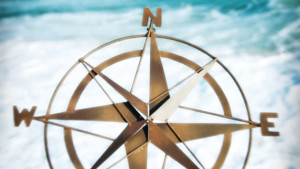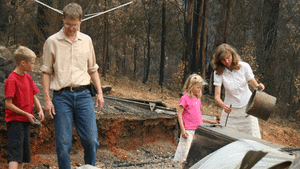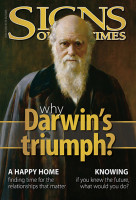If ever there was a time when most of us feel the need for hope but are tempted to despair, when we feel like sitting on the ash heap with a potsherd as did the patriarch Job, when we feel like weeping and gnashing our teeth, now might be that time.
The daily dose of the world's woes are presented to us in our lounge rooms in living colour on large-screen plasmas, and repeated endlessly on other media till the message hits home like a sledge-hammer and we stagger from one devastating news report to another.
The economy's shot, our superannuation's gone, the climate is erratic, disasters are everywhere, cars are crashing, trains derail, ferries sink, towns collapse in earthquakes and people are injured and dying. Victoria's on fire, Queensland's awash, farmers in drought, relationships shattered and politicians promise big and deliver little. Hopes are shatter and dreams die young.
Perhaps this is why Metroplex Atheists and the Dallas-Plano Atheist Meetup Group have combined with the national Coalition of Reason to bring their billboard campaign to Dallas— Fort Worth, Texas, USA. The campaign has started! Against the sky blue background of the billboard with its fleecy white clouds floating by, the question is asked in large letters, “Don't believe in God?” Then follows the affirmation: “You are not alone.” It strikes a chord with many: Is anyone out there or have we been left to disintegrate on our own? It would be nice to have some good news for a change, but hope is in short supply. If only we could know that someone was in control. Life on this planet appears to be so random.
Into this environment comes a movie that recently hit multiplex big screens— making big money. Knowing tells us that “tomorrow” might be the end of the world, but in its own way tries to bring hope for humanity. The story plot is complicated and in many ways surreal, but it centres around John Koestler (Nicholas Cage), a professor at Massachusetts Institute of Technology, who recently lost his wife in a fire tragedy and is left confused and cynical believing that life has “no grand purpose.”
John is left to bring up his son, Caleb, alone. Caleb brings home a sheet of numbers, which he obliquely suggests may be some kind of code.
John dismisses it at first but then decides Caleb might be right after all when his overflowing glass of Bourbon leaves a ring around numbers corresponding to nine-eleven. The numbers catalogue every major tragedy of the past 50 years, along with the number of people killed. They are all there: 9/11, the southeast Asian tsunami, the Oklahoma City bombing, and so it goes on, both in the US and around the world.
John then realises there are just three dates left on the sheet, all of them set to take place in the next few days.
What do you do with that kind of knowledge— a knowledge of the future? It challenges his cynical worldview. Does this mean there is someone out there? Can we know the future? Can we actually change the future?
The numbers on the paper—and subsequent, spectacular events—shake John's belief in “randomness” as the only cause in nature, of course. If they predict the future with such uncanny accuracy, that must mean something or Somebody knows what's going on.
A fellow professor at first shrugs off the predictions as coincidence: “People see what they want to see in them,”
he says. But John becomes convinced there's something more to it.
The movie moves to its spectacular conclusion and the destruction of the world, full of biblical imagery laced with dramatic, creative filmmaking that reveals another world behind the scenes and the “whisper people,” as Caleb calls them, who were there “protecting us all along.” They did nothing however to protect the world from its inevitable destruction, but, rather, swept up the two “chosen” children and dropped them off in a new, and unspoilt realm, with its own very own tree of life to restart humanity as a new Adam and Eve.
And while some of the relevance may be lost on the biblically illiterate, there are parallels in the Bible.
Knowledge of the future has been a dream of humankind throughout history.
It's a trait common to humanity to peer uncomprehendingly into an unknown future seeking clues to enable us to make the correct decisions in the present. The future is fascinating because it is so inaccessible, and the only way to can really know it is to wait until the future becomes the present. And so, like John, what would we do if we did know?
People who have claimed to predict the future have often been written off as cranks. Italian scientist, Gioacchino Giuliani, from the National Institute of Astrophysics in Italy, predicted a major earthquake around the medieval town of L'Aquila, 100 kilometres from Rome, weeks before disaster struck on April 6, 2009, killing hundreds.
Instead of heeding the warning, he was denounced to authorities for spreading panic. Vans with loudspeakers drove around the town a month before the tragedy, predicting that a large quake was on the way and imploring locals to evacuate, but the only result was the mayor's anger. Giuliani was reported to police for “spreading alarm” and was forced to remove his findings from the internet. It's hard to distinguish between cranks and those who give a valid warning.
In ancient times, the Delphic Oracle claimed to provide insights into the future. People from all over the world, regardless of their status or position, would travel to this remote and barren hillside in Greece to consult her and to have their future fortunes told.
After attending purification rites in the Castilian spring, the seekers would present themselves in her presence to hear the cryptic glimpses into their personal futures. On one occasion, a great general consulted the oracle, seeking insights regarding the outcome of a significant battle. The fate of the nation was hanging on the outcome of this confrontation. The oracle uttered the prediction, “A great army will be defeated.” The general went away happy and assured. The prediction proved true, of course, but unfortunately the army that was defeated was his own!
The days in which we live are more sophisticated and the simple superstitions of the past have been replaced by scientific methods. However, the fascination with the future remains and is perhaps even intensified. Astrological charts with their claims to know confront us from the pages of almost every popular glossy magazine. For those who don't read, they're broadcast on breakfast radio so you can check your day for fortune or fatality as you drive to work.
Late-night television carries appealing advertisements for tarot card reading and fortune telling. And in a more sophisticated way business analysts plot the trends with computer modelling to gain insight into the future for profit.
And then there is the weather forecast! The simple fact remains: despite the simple and the sophisticated approaches, despite the bizarre and the intellectual, despite the law of cause and effect, no one knows, really. The future is always just that tantalising step away.
And perhaps it is just as well for who knows how we would behave if we had an accurate glimpse into our personal futures. It would probably be a vehicle for greed or power; and would not produce a happier or more desirable society.
Whatever we may think of the uncertainties of the future, however, there is one thought that can provide us with comfort and security in a time when the future seems to stretch ahead with mileposts of unending tension and concern; when people look ahead with apprehension rather than anticipation.
“We have nothing to fear for the future except as we shall forget the way that God has led in our past history,” writes one Bible commentator.* Confidence will be engendered by our experience with God. In Scripture, those who have chosen Him—Christ—are promised security for the future, and because they know Him, they can trust Him.
We will not be left to be “the chosen”
by some ethereal, alien force and the final annihilation of Knowing or the ambiguities of Delphi, but, rather, we can choose Jesus today. We will then have the hope that God is still in control despite the apparent randomness of our current existence. There is a time ahead when the record will be set straight, when the score will be settled and we can make sense of our disordered, troubled lives on earth.
We are able to believe in a positive future because we have seen God at work in our lives and he has promised not to let us down. The words of Jesus, spoken in an upper room in Jerusalem long ago, to a group of men apprehensive of the future, still speak with certainty and assurance to us today. “Don't let this throw you. You trust in God, don't you? Trust me. There is plenty of room for you in my Father's home. If that weren't so, would I have told you that I'm on my way to get a room ready for you? And if I'm on my way to get your room ready, I'll come back and get you so you can live where I live” (John 14:1–3, The Message).
* Ellen G White, Life Sketches, page 196.





